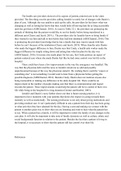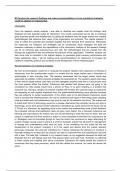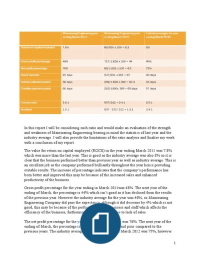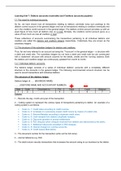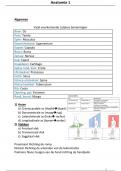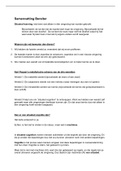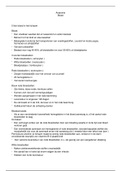Theme 1
A - Jahiliyyah and Night of Power
Key Topic AO1
Jahiliyyah - - Known as pre-islamic arabia
Life at the Time of Muhammad - Jahiliyyah translates to the age of ignorance
- Frederick Denny - “the term ‘jahiliyyah’ was intended to discredit the idolatrous and licentious days
of old, before the islamic virtues and habits came”
Social and Political - Desert areas were populated by bedouin nomads.
Organisation - There were more populated bases around oasis areas, for example makkah and madinah.
- Arab culture was built on a complex tribal system composed of extended families and clans. Each
tribe was led by a shaykh.
- The lifestyle included raiding and trading but not without a rich heritage of rules and conduct that
included modesty, honour, generosity, hospitality and giving as well as virtue and bravery.
- By Muhammads time, trade with surrounding lands had increased, creating social implications, such
as an increase in poverty and inequality.
- Esposito - “intertribal warfare was a long established activity… its ultimate goal was to weaken and
eventually absorb other tribes by reducing them to a dependent status”
Religion - Judaism was sparse with settlers scattered around arabia, although they were densely populated in
Yathrib, Madinah. It was a diluted version of the modern Judaism.
- Guillame - “the Jews dominated the economic growth of the Hijaz”
- Christianity was strong in the Yemen area, two tribes in particular, Judham and Udhra. It also had
sects including monophysites, nestorians, gnostics and ghassanids.
- Zoroastrianism was based on the idea of a God of light eternally battling the God of darkness. They
named their God Ahura Mazda, meaning “wise God”. Zarathustras were ancient teachers of heaven
and hell and the day of judgement.
- Paganism had no real authoritative figure nor religious writings. There were many different deities
represented by objects. Kahins (spiritual poets) entered trances and and revealed messages about
the spiritual realm. The focus was the Ka’bah where 360 gods were housed and where the ka’bah
, stone was a central place to worship Allah and his three daughters.
- Hanifs had a strict lifestyle of moral purity and were monotheistic however, theology held a
superficial role
- Aslan - “Paganism is not so much a unified system of beliefs and practices as it is a religious
perspective, one that is receptive to a multitude of influences and interpretations”
- Waines - “The Gods were consulted on various matters of concerns: setting the dates for
marriage..”
Moral Features - Turner - “yet the old image of the ‘uncivilised bedouin’ is most misleading, for in fact desert life was
lived to the highest of values”
- There were morally questionable practices:
- The tribal system encouraged a feudal system
- Killing was not morally incorrect unless it was one’s own tribesmen or allies. If this was done, other
tribes had to avenge this death, inevitably causing tribal conflict
- Robbery was allowed unless it was your own tribe
- There was gambling, prostitution and general dishonesty
- Female infanticide was normal, as a tribe could only support a given number.
- Women were treated like slaves and had no specific rights.
- Quran - “Kill not your children for fear of want: We shall provide sustenance for them as well as for
you, Verily, the killing of them is a great sin.”
The Night of Power - Laylatul Qadr - “Night of Power”
- Quran - “better than a thousand months”
- Hadith - “not once did i receive a revelation without thinking my soul had been ripped away”
- Muhammad was meditating in the cave of Hira when the angel Jibril came to him and commanded
that he read
- Although Muhammad could not read at first, God gifted him with the ability and he recited.
- Guillame - “some of his biographers have deleted the passages which speak of his doubts and
fears; but they are perhaps the most convincing elements in the story.”
- Muhammad was severely distressed by this incident and was full of doubts and fears.
- However, he went to his wife Khadijah for comfort and she encouraged him.
- At first, Muhammad converted people in secret and taught them how to pray
- Turner - “...teaching his household how to stand, bow and prostrate before God”
,Muhammad’s Preaching in - The early message delivered by Muhammas had several underlying themes:
Makkah - Muhammad should be recognised as seal of the prophets
- Revelation and proclamation of the message of Islam
- Good news and warnings
- Divine unity
- Prophethood
- Bodily resurrection
- Judgement day
- Shirk
- Muhammad called for uncompromising monotheism and so challenged the deep rooted polytheism
surrounding the Ka’bah
- He spoke of judgement and personal responsibility, bringing to light many social injustices and
condemning many ancestors fo the Makkans
- He began to present a threat for a number of reasons
- The call to monotheism affected their businesses
- The power of the city was under challenge
- Their popularity as leaders faltered as Muhammads grew
The Makkan Reaction - Muhammad criticised the idolatry of the Makkans and their customs.
- Makkans were concerned that the criticisms of the annual pilgrimage made by visitors would affect
their business
- The polytheistic nature of makkah was in direct conflict with Muhammads message
, B - Hijrah
Key Topic AO1
The Persecution in Makkah - Muhammad was accused of sorcery and lying; people were sceptical because he didnt perform any
miracles
- The meccans responded with a boycott whereby they no longer did business with muslims in order
to make them suffer financially
- Turner - “something like a boycott of the muslims was put in force”
- Muhammads weakest followers, such as the slaves, were tortured and killed for their allegiance
- Brown - “the leaders of the Quraysh began to plot his destruction”
The Night Journey - It was at this low point that Muhammad experienced the night journey, Muhammad’s miraculous
ascension to heaven.
- Turner - “arguably, the most intense spiritual journey of his life”
- The prophet travelled from Makkah to Jerusalem in a single night on a winged creature called the
Buraq
- He was tested with a choice of wine, milk and water and he chose milk - a symbol of the middle way
- He was given an insight into hell and a tour of heaven
- Muhammad was commanded to offer 50 daily prayers but negotiated this down to 5
- This experience was significant as it’s timing consolidated Muhammad’s personal strength and
reserve
Factors that led to the Hijrah - Persecution
- Threats on life
- Inability to practise Islam freely
- Lack of influence of Islam
- Opposition from Makkans
- Attempts to migrate to Taif failed whereas Muhammad had been able to convert people from
Madinah while trading
The Hijrah - An escape
A - Jahiliyyah and Night of Power
Key Topic AO1
Jahiliyyah - - Known as pre-islamic arabia
Life at the Time of Muhammad - Jahiliyyah translates to the age of ignorance
- Frederick Denny - “the term ‘jahiliyyah’ was intended to discredit the idolatrous and licentious days
of old, before the islamic virtues and habits came”
Social and Political - Desert areas were populated by bedouin nomads.
Organisation - There were more populated bases around oasis areas, for example makkah and madinah.
- Arab culture was built on a complex tribal system composed of extended families and clans. Each
tribe was led by a shaykh.
- The lifestyle included raiding and trading but not without a rich heritage of rules and conduct that
included modesty, honour, generosity, hospitality and giving as well as virtue and bravery.
- By Muhammads time, trade with surrounding lands had increased, creating social implications, such
as an increase in poverty and inequality.
- Esposito - “intertribal warfare was a long established activity… its ultimate goal was to weaken and
eventually absorb other tribes by reducing them to a dependent status”
Religion - Judaism was sparse with settlers scattered around arabia, although they were densely populated in
Yathrib, Madinah. It was a diluted version of the modern Judaism.
- Guillame - “the Jews dominated the economic growth of the Hijaz”
- Christianity was strong in the Yemen area, two tribes in particular, Judham and Udhra. It also had
sects including monophysites, nestorians, gnostics and ghassanids.
- Zoroastrianism was based on the idea of a God of light eternally battling the God of darkness. They
named their God Ahura Mazda, meaning “wise God”. Zarathustras were ancient teachers of heaven
and hell and the day of judgement.
- Paganism had no real authoritative figure nor religious writings. There were many different deities
represented by objects. Kahins (spiritual poets) entered trances and and revealed messages about
the spiritual realm. The focus was the Ka’bah where 360 gods were housed and where the ka’bah
, stone was a central place to worship Allah and his three daughters.
- Hanifs had a strict lifestyle of moral purity and were monotheistic however, theology held a
superficial role
- Aslan - “Paganism is not so much a unified system of beliefs and practices as it is a religious
perspective, one that is receptive to a multitude of influences and interpretations”
- Waines - “The Gods were consulted on various matters of concerns: setting the dates for
marriage..”
Moral Features - Turner - “yet the old image of the ‘uncivilised bedouin’ is most misleading, for in fact desert life was
lived to the highest of values”
- There were morally questionable practices:
- The tribal system encouraged a feudal system
- Killing was not morally incorrect unless it was one’s own tribesmen or allies. If this was done, other
tribes had to avenge this death, inevitably causing tribal conflict
- Robbery was allowed unless it was your own tribe
- There was gambling, prostitution and general dishonesty
- Female infanticide was normal, as a tribe could only support a given number.
- Women were treated like slaves and had no specific rights.
- Quran - “Kill not your children for fear of want: We shall provide sustenance for them as well as for
you, Verily, the killing of them is a great sin.”
The Night of Power - Laylatul Qadr - “Night of Power”
- Quran - “better than a thousand months”
- Hadith - “not once did i receive a revelation without thinking my soul had been ripped away”
- Muhammad was meditating in the cave of Hira when the angel Jibril came to him and commanded
that he read
- Although Muhammad could not read at first, God gifted him with the ability and he recited.
- Guillame - “some of his biographers have deleted the passages which speak of his doubts and
fears; but they are perhaps the most convincing elements in the story.”
- Muhammad was severely distressed by this incident and was full of doubts and fears.
- However, he went to his wife Khadijah for comfort and she encouraged him.
- At first, Muhammad converted people in secret and taught them how to pray
- Turner - “...teaching his household how to stand, bow and prostrate before God”
,Muhammad’s Preaching in - The early message delivered by Muhammas had several underlying themes:
Makkah - Muhammad should be recognised as seal of the prophets
- Revelation and proclamation of the message of Islam
- Good news and warnings
- Divine unity
- Prophethood
- Bodily resurrection
- Judgement day
- Shirk
- Muhammad called for uncompromising monotheism and so challenged the deep rooted polytheism
surrounding the Ka’bah
- He spoke of judgement and personal responsibility, bringing to light many social injustices and
condemning many ancestors fo the Makkans
- He began to present a threat for a number of reasons
- The call to monotheism affected their businesses
- The power of the city was under challenge
- Their popularity as leaders faltered as Muhammads grew
The Makkan Reaction - Muhammad criticised the idolatry of the Makkans and their customs.
- Makkans were concerned that the criticisms of the annual pilgrimage made by visitors would affect
their business
- The polytheistic nature of makkah was in direct conflict with Muhammads message
, B - Hijrah
Key Topic AO1
The Persecution in Makkah - Muhammad was accused of sorcery and lying; people were sceptical because he didnt perform any
miracles
- The meccans responded with a boycott whereby they no longer did business with muslims in order
to make them suffer financially
- Turner - “something like a boycott of the muslims was put in force”
- Muhammads weakest followers, such as the slaves, were tortured and killed for their allegiance
- Brown - “the leaders of the Quraysh began to plot his destruction”
The Night Journey - It was at this low point that Muhammad experienced the night journey, Muhammad’s miraculous
ascension to heaven.
- Turner - “arguably, the most intense spiritual journey of his life”
- The prophet travelled from Makkah to Jerusalem in a single night on a winged creature called the
Buraq
- He was tested with a choice of wine, milk and water and he chose milk - a symbol of the middle way
- He was given an insight into hell and a tour of heaven
- Muhammad was commanded to offer 50 daily prayers but negotiated this down to 5
- This experience was significant as it’s timing consolidated Muhammad’s personal strength and
reserve
Factors that led to the Hijrah - Persecution
- Threats on life
- Inability to practise Islam freely
- Lack of influence of Islam
- Opposition from Makkans
- Attempts to migrate to Taif failed whereas Muhammad had been able to convert people from
Madinah while trading
The Hijrah - An escape

